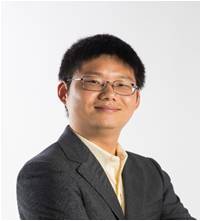报告题目:Multivalent
ions induce lateral structural inhomogeneities in polyelectrolyte brushes
报告人:愈 璟 助理教授
邀请人:张伟娜 研究员
报告时间:4月26日(星期五)14:30
报告地点:科技创新大楼C501室
Abstract
Understanding
the response of polyelectrolytes to their environment has challenged materials
scientists for decades. Polyelectrolyte brushes are of particular interest, as
they can regulate transport of ions and molecules, control wettability and
adhesion of surfaces, or convert chemical and biochemical stimuli into optical,
electrical, and mechanical signals. We combinedneutron-reflectivity (NR), atomic
force microscopy (AFM), surface forces apparatus (SFA) measurements, and
coarse-grained molecular dynamics (MD) simulations to study the structure of
planar biomimetic polyelectrolyte brushes (poly(styrenesulfonate), PSS) in a
variety of solvent conditions, especially in the presence of multivalent
counterions. Multivalent-ion induced lateral structural inhomogeneitiesof the
PSS brushes were first indicated by NR measurements. AFM images provide a
direct visualization of lateral inhomogeneities on the surface of
polyelectrolyte brushes collapsed in solutions containing trivalent
counterions. These images are interpreted in the context of a coarse-grained
molecular model, and are corroborated by accompanying interaction-force
measurements with the SFA. Our findings indicate that lateral inhomogeneities
are absent from PSS brush layers collapsed in a poor solvent without
multivalent ions. The inhomogeneous structures of the polyelectrolyte brushes
in the presence of multivalent ions can dramatically alter their
functionalities in various biomedical applications, such as lubrication,
sensors, and DNA-based microarrays.
Biography

Dr. Yu Jing is an assistant professor in
the School of Materials Science and Engineering (MSE) at Nanyang Technological
University (NTU) in Singapore. He obtained his Bachelor’s degree from Tsinghua
University in 2007, and PhD from the University of California, Santa Barbara in
2012, both in Chemical Engineering. His PhD research under the supervision of
Prof. Jacob Israelachvili focused on the nanomechanics of biomaterials and
biomimetics. He conducted experimental and theoretical studies on both mussel
and gecko adhesive systems, and developed bio-inspired polymer surfaces and
nano-structured materials. In 2014, he expanded his research interests towards
polyelectrolytes brushes during his postdoc with Prof. Matthew Tirrell at the
University of Chicago.
